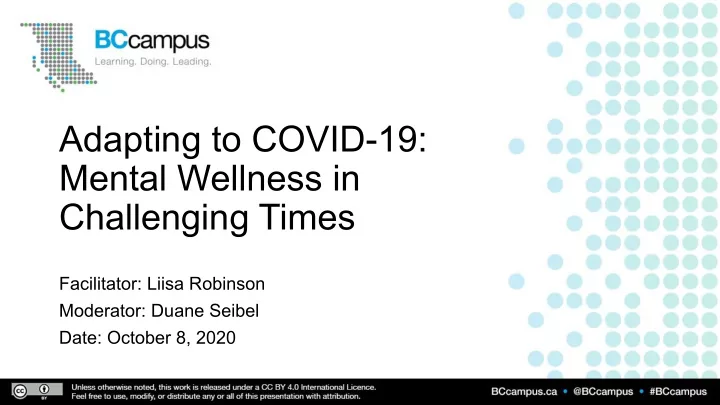

Adapting to COVID-19: Mental Wellness in Challenging Times Facilitator: Liisa Robinson Moderator: Duane Seibel Date: October 8, 2020
Camosun College campuses are located on the traditional territories of the Lkwungen and W ̱ SÁNEĆ peoples. We acknowledge their welcome and graciousness to the students who seek knowledge here. Map source: BC Ministry of Education.
Liisa Robinson Counsellor, Camosun College
Three words that describe how COVID can impact mental health?
Three words that describe how COVID can impact mental health?
How to Cope with Traumatic Events like Coronavirus The World Is Experiencing Mass Trauma from COVID-19: What You Can Do Surviving the trauma of COVID-19
Trauma: A circumstance that overwhelms one’s ability to cope.
What is an important piece of knowledge that you have about yourself or your values?
What is an important piece of knowledge that you have about yourself or your values?
Not everyone who suffers trauma experiences post-traumatic growth, but for those who do, the changes can be lifelong. Evidence suggests that around half to two-thirds of trauma survivors experience post- traumatic growth. -Richard Tedeschi and Lawrence Calhoun
When individuals feel self-pity, they become immersed in their own problems and forget that others have similar problems. They ignore their interconnections with others, and instead feel that they are the only ones in the world who are suffering. Self-pity tends to emphasize egocentric feelings of separation from others and exaggerate the extent of personal suffering. Self-compassion, on the other hand, allows one to see the related experiences of self and other without these feelings of isolation and disconnection. -Kristin Neff
“Why Me?” VS. “All of US”
Dialectical
DBT Skill: Mindfulness We do not meditate to become better meditators. We meditate to become more skillful at LIFE.
DBT Skill: Radical Acceptance
The second, third, fourth and fifth arrow…
If I accept what happened, then I approve of it. Then I like it. Then I’m OK with it. Then I approve of COVID, or any other circumstance I don’t want. Then I absolve people who caused harm all responsibility. Then I can’t do anything about losing my job or losing my home. I can’t change it. Then I resign myself to being miserable. Then I keep wallowing and suffering.
DBT Skill: Radical Acceptance Step One: Think of an Important event Step Two: What Caused the Event? Step Three: Accepting the Feelings Step Four: Choosing a coping statement Step Five: Noticing places for effective action
Examples of Coping Statements: I don’t have to like it to accept it. This is happening for me, not to me. I’m in good relationship with reality.
DBT Skill: Cope Ahead •Anticipate things that will be difficult and practice coping ahead . This involves imagining acting skillfully in the worst-case scenario. •It is important that we take care of ourselves physically. •Get adequate exercise . Particularly if you are bound to your home, find creative ways to do this. It could be climbing stairs, doing yoga, or walking in your neighborhood (if allowed). • Avoid excessive or improper use of medications, drugs, or alcohol . •Make sure to get adequate sleep . •Be sure to eat well .
How do you best cope ahead?
How do you best cope ahead?
Since we place so much emphasis on walking the middle path in DBT, I think it is important to aspire to taking the pandemic very seriously (based on scientific data) while not becoming immobilized by the weight of it. My own experience of this is that I have been in my home since the end of February, except to go to the grocery store. I’m very aware that there are others I know who have been personally affected by illness and death. At the same time, I’m currently healthy, the sun is shining, I’m cooking and gardening, and my neighbors are being very kind to each other (from a distance). (Tony Dubose) Be Calm. Be Kind. Be Safe. – Dr. Bonnie Henry
Thank-you https://covid19.bccampus.ca/category/webinars/ https://bccampus.ca/subscribe/?subscribe=
Recommend
More recommend